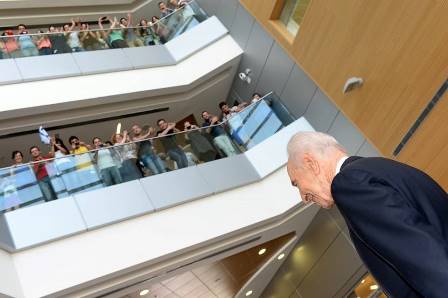
The Honorable President of the State of Israel Shimon Peres toured several of BGU's cyber security labs on Monday morning before receiving the Ben-Gurion Leadership Award.
During his tour of the Labs, the FM project was unveiled for his viewing.
About the FM project:
Information is the most critical asset of modern organizations, and accordingly coveted by adversaries. When highly sensitive data is involved, an organization may resort to air-gap isolation, in which there is no networking connection between the inner network and the external world. While infiltrating an air-gapped network has been proven feasible in recent years (e.g., Stuxnet), data exfiltration from an air-gapped network is still considered to be one of the most challenging phases of an advanced attack.
Mobile phones, equipped with FM receivers, can be used to collect data from compromised computers that are part of an air-gapped network. While it is known that software can intentionally create radio frequency emanations from a video display unit, this is the first time that mobile phones have been considered in an attack model as intended receivers of carefully crafted radio frequency emanations.
Such attacks are particularly relevant in cases where employees are allowed to bring their own mobile phone to the workplace and carry it around. Textual and binary data can be exfiltrated from a physically isolated computer to a mobile phone at a distance of 1-6 meters, with effective bandwidth of 13-60 Bps (Bytes per second).
The researchers at the Cyber Security labs, headed by Prof. Yuval Elovici, have examined the model and thought about the defensive measures needed to prevent an FM attack via mobile phone.
